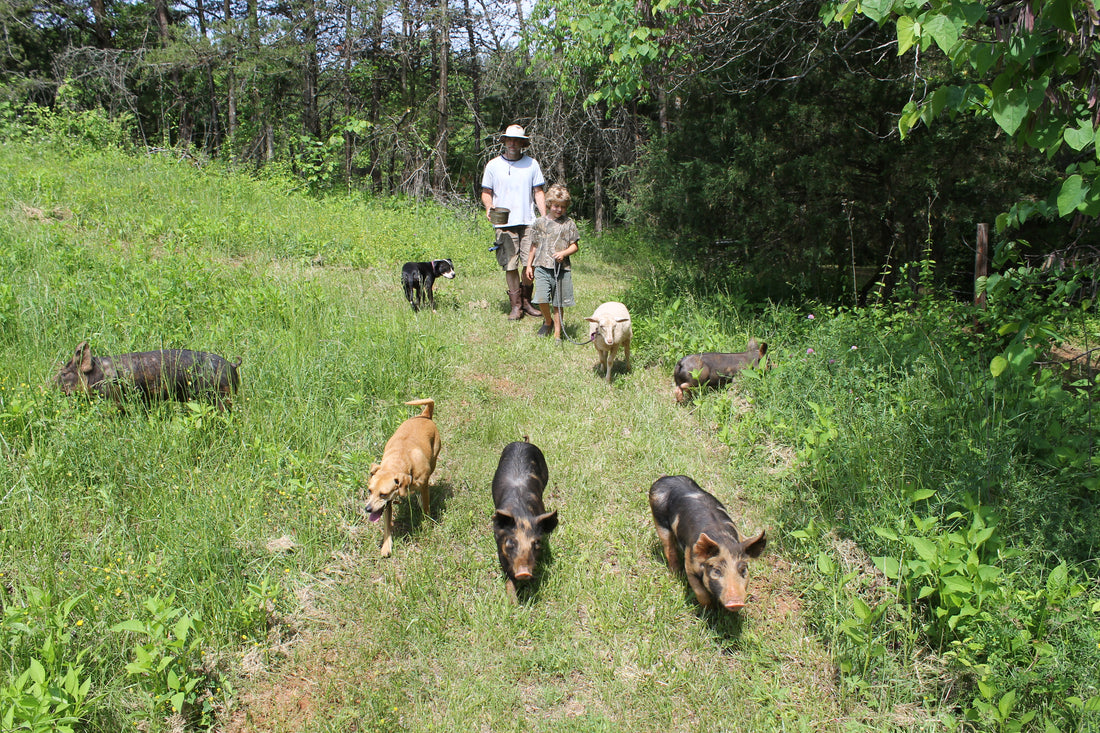This is the first part of a story about how a couple of scrappy marine biologists started a mushroom farm, Borrowed Land Farm, and how that mushroom farm became a mushroom lab, The Fungal Network.
Back in 2015 we were "homesteading" -- trying to live close to the land and raise (or forage) as much as possible of the food that we were eating. In part as an outlet and educational opportunity for our two elementary school-aged boys, and in part to engage with our community, we decided to start selling some of what we were producing. Initially eggs, then also meat, and then mushrooms. We had been growing on logs for several years, but decided to start growing indoors on straw so we could have mushrooms year-round. We called our new venture Borrowed Land Farm, in honor of an idea beautifully expressed by Wendell Berry, who wrote of "a man who knows that the world is not given by his fathers, but borrowed from his children..."
The land we were on was quite literally borrowed -- we had recently moved from the hills of SW Virginia and were borrowing land on my brother's large farm, a 58-acre former tobacco farm that he and his family were actively working to nurse back to health. We planted our roots (and our mycelium) here and set to work slowly building a farm, pretty quickly narrowing our focus to just selling fresh gourmet mushrooms. Initially at one local farmer's market, then moving into bigger and bigger farmers markets and bigger and more wide-spread restaurants.
Building any business is an exercise in dedication, optimism and patience. Building a business selling mushrooms in a part of the country where most people have never had mushrooms except at a salad bar, and are generally skeptical at best about the idea of eating them is even harder. Back then a camp stove and skillet were a standard part of our farmers market gear. We would saute mushrooms in butter and garlic so we could give out free samples to the skeptics, knowing that the smell of mushrooms sizzling in butter and garlic will always bring people to the table. We started small, but we kept our heads down, worked hard, and learned our lessons, being sure to prioritize building relationships and sharing knowledge while we were at it.
We met many, many fantastic people, both customers and other farmers. I've often heard stories about places that seem okay to the casual observer but have a "seedy underbelly," but I'm here to tell you that in the small farmer/local food movement we discovered an underbelly of kind and conscientious people who care passionately about the food that they are raising, the land that is providing it, and the other people involved in the movement. Other small farmers were supportive and helpful, and our customers were an absolute joy to spend time with. So many of them were really passionate about the mushrooms, and we always made sure to have at least two people at our stand so at least one of us could be chatting with customers while the other worked.
The first few years, while a lot of work, were exciting and humbling. We were gratified by all the support we had benefitted from and were proud of what we had built with that support. We had gotten to where we were by working, scraping, grinding it out, and finding creative ways around large expenses, which just weren't an option for us. We were selling our mushrooms as much as almost 100 miles away, we had been featured in local and regional papers, in the Wall Street Journal, and on our state's PBS channel's Science TV show. But it had been five years of hard work and, unbeknownst to us, COVID was coming.

